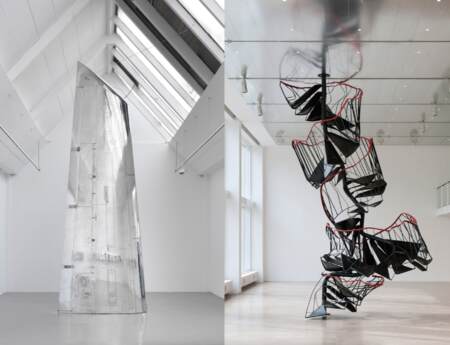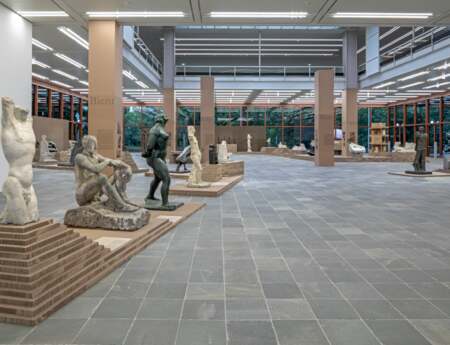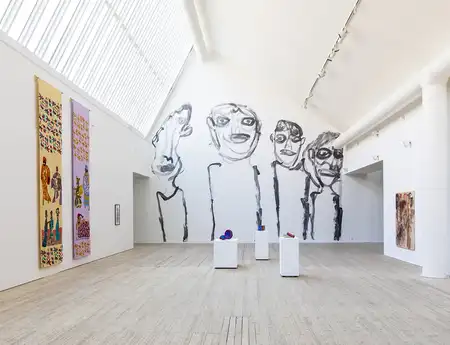Vereinigung bildender Künstler*innen Wiener Secession
Friedrichstraße 12
1010 Vienna
Österreich
Forms of the Shadow Curated by Sunjung Kim

Nilbar Güreş
Biography:
The practice of Nilbar Güreş (b. 1977, Istanbul, TR) spans photography, video, film, painting, performance, sculpture, installation, and mixed-media collage on fabric. Her works depart from biography then swirls around to address larger issues, and is particularly sound to social injustice, gender roles and cultural identity codes – she researches, documents and finds poetic ways to flout conventions in witty figurations.
Güreş received a B.A. in Painting from the Faculty of Fine Arts, Marmara University, Istanbul, TR, and an M.A. in Painting & Graphics from the Academy of Fine Arts, Vienna, AT. Upon receiving her M.A., the artist studied Art and Textile Pedagogy at the University of Applied Arts Vienna, AT. She has received the Oustanding Artist Award for Photography by Ministry for arts and culture Vienna, AT in 2023, Research Grant Ministry for Arts & Cu
lture Austria in 2023, the Hilde Goldschmidt Prize in 2013, the Otto Mauer Award of 2014, Fifth edition of the BC21 (Belvedere Contemporary) Art Award 2015 in Austria, and De'Longhi Art Projects Artist Award of London Art Fair in 2018, Prix Maud Mottier Award in 2021. In 2012, Güreş completed a residency at International Studio & Curatorial Program in New York, US, supported by BMUKK, Vienna, AT.
Nilbar Güreş lives and works in Naples, IT, Vienna, AT, and Istanbul, TR.
Works:
Nilbar Güreş, Acik Telefon Kulübesi / Open Phone Booth, 2011
3-channel HD video installation, colour, sound, 33:46 min.
Courtesy of the artist and Galerie Martin Janda, Vienna
Open Phone Booth is a telephone in the open countryside, which is nothing special in the age of the mobile phone. However, in Nilbar Güreş’ video installation she engages with a geopolitical context, a region in eastern Turkey where the infrastructure has suffered from significant deficits in recent decades due to conflicts. These deficits include the collapse of the local telephone exchange and a lack of telephone masts. The residents of Bingöl, a K urdishAlevi village, who accompany Güreş for her films are forced to climb the surrounding hills just to get any reception on their telephones. These people are not out to enjoy the isolation of the idyllic surroundings; instead, they have made the climb in order to deal with personal and professional matters. Open Phone Booth Güreş shows, with great sensitivity but without sentimentality, the paradox of an increasingly accelerated world dominated by technology and economic considerations, and the drudgery of the almost archaic situation the people there have to struggle with.
Nilbar Güreş, Land, 2017–24
mixed media on fabric
218 x 105 cm
Courtesy of the artist and Galerie Martin Janda, Vienna
This work started in 2017. This is our village: wolves, bears, drones, phones and internet; communication issues. Existing nature in the created: in one. It is night, a drone is passing, there is a door belonging to a house in the village.
I also used a real old phone which I dissembled and installed on this collage.
I used colours of cultures; Kurdish Armenian.
I used wool and a very old mattress cover from 70s. Inland immigration is still not seen as an issue but it actually is. Kurds don’t even speak Turkish and they have to leave their land for big cities for food and work …
Many wires on the work: an assemblage. Every number equals a letter, so I installed the wires and letters accordingly. Forms are also created by wires; they are some of the animals from the region. The Brown part: the soil is soft, in waves, in movement …
Nilbar Güreş, Van Lake / One Lake, 2024
mixed media on polypropylene fabric bag
60 x 83 cm
Courtesy of the artist and Galerie Martin Janda, Vienna
I don’t believe in borders, so I never use flags, but rather their colours, because colours symbolize cultures.
Van lake is a lake in Kurdish-Armenian-Arab-Jewish geography. Very close to two borders.
Here I created my map from which Van Lake runs over a book. That book is a second-hand book from a restaurant which has been used by a waiter. Many people from the area leave their land to do underqualified jobs. There is white wool, a common colour of Kurds and Armenians. The background material is a bag, that is quite resistant for weights, transporting cheese, butter etc from the region to bigger cities where the emigrants from this region are based.
Two wires as two figures, of whom we don’t know the gender. They are overl
apping. Van Lake: one lake.
Nilbar Güreş, From Yesterday to Yesterday, 2024
photos from the Güreş family album
100 x 75 cm
Courtesy of the artist and Galerie Martin Janda, Vienna
Family photo-album from different dates. They create a frame in which there is no picture. Because “usually” the frame is the picture.
is currently the artistic director of Art Sonje Center in Seoul (2022–), the chair of ICOM Republic of Korea (2023–), and a board member of ICOM ASPAC (International Council of Museums Asia-Pacific Alliance). She was the president of the Gwangju Biennale Foundation (2017–2021), director of Art Sonje Center (2016–2017), the artistic director of ACC Archive & Research at the Asia Art Culture Center (2014–2015), and chief curator and deputy director (1993–2004) of Art Sonje Center. Additionally, she is the founder and artistic director of the REAL DMZ PROJECT, an art and research project designed to cross the boundaries of the museum and launched in 2011 to explore the (in)visible borders of the Demilitarized Zone through the critical lens of art and to raise awareness about the division of Korea. She recently curated Do Ho Suh’s Speculations at the Art Sonje Center.


